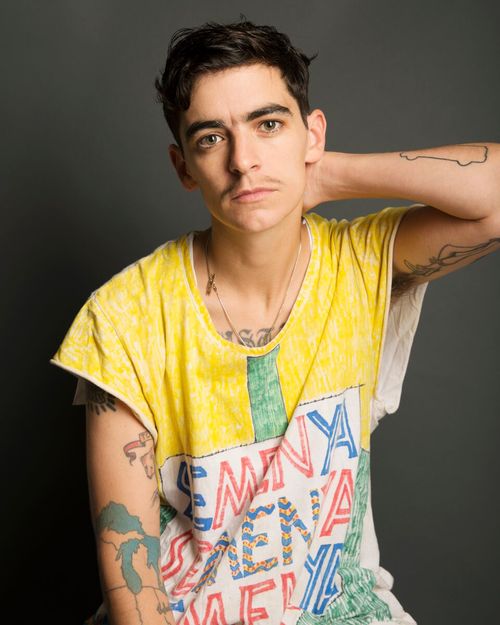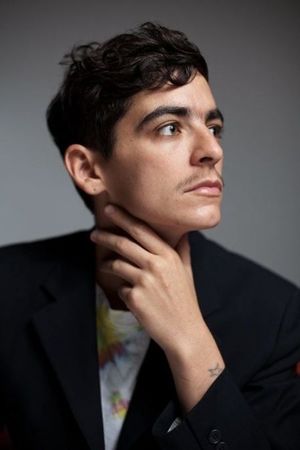Photos via JD’s site collection
“JD Samson is best known as leader of the band MEN and for being one-third of the electronic-feminist-punk band and performance project, Le Tigre. For more than a decade JD’s career as a visual artist, musician, producer and DJ has landed her at the intersection of the music, art, activism, and fashion. During that time she has toured the world, produced songs for Grammy award winning artists, written for publications such as Huffington Post, Talkhouse, and Creative Time Review, created multi media artwork, hosted documentary programs, acted, modeled, and engaged in direct support with a wide-range of progressive social and political causes.”
“I am just living in this body, and that is political. And sometimes brave.”
[Tom Tom] How did you become interested in music and what inspired you to become a DJ and producer?
 [JD] Well, I grew up in Ohio to artist parents that had, well… gotten day jobs. So, creativity was always somewhat supported. I used to stay up all night drawing and listening to my clock radio. I was super into pop and R&B music, as that is why my parents listened to. I gravitated to the emotion of music, the lyrical content, but the way the production supported those feelings. That was the hook for me. I went to film school and focused on some kind of adaptation of the projector into long drawings that implemented film theory, but within the context of public art. During this time, I managed the venue at my school and brought in bands from all over the country. As a promoter, I met a lot of feminist musicians and started to become a part of that scene. That was my first real interest in being in a band to be honest. Before that, I just played my classical guitar when I needed some peace. Le Tigre was my first real band, besides the one I had when I was in 7th grade, and it was through Le Tigre where I was able to adapt all of my other mediums into sound and performance. I have always thought of myself as an artist first, and that conceptually I can find a way to produce in any medium. I am just most well known as a musician!
[JD] Well, I grew up in Ohio to artist parents that had, well… gotten day jobs. So, creativity was always somewhat supported. I used to stay up all night drawing and listening to my clock radio. I was super into pop and R&B music, as that is why my parents listened to. I gravitated to the emotion of music, the lyrical content, but the way the production supported those feelings. That was the hook for me. I went to film school and focused on some kind of adaptation of the projector into long drawings that implemented film theory, but within the context of public art. During this time, I managed the venue at my school and brought in bands from all over the country. As a promoter, I met a lot of feminist musicians and started to become a part of that scene. That was my first real interest in being in a band to be honest. Before that, I just played my classical guitar when I needed some peace. Le Tigre was my first real band, besides the one I had when I was in 7th grade, and it was through Le Tigre where I was able to adapt all of my other mediums into sound and performance. I have always thought of myself as an artist first, and that conceptually I can find a way to produce in any medium. I am just most well known as a musician!
You have so many musical affiliations; let’s first start with how you became involved with Le Tigre, the amazing alt-pop and political electronic rock band featuring Bikini Kill’s Kathleen Hanna and Johanna Fateman. Can you tell us about that experience?
Well, as mentioned before, I was putting on shows at my college, and coming to the city and frequenting the feminist queer art scene hangouts. I met Kathleen and Jo and Sadie through different friends and collaborators, and at one point they asked me to go on tour to be their projectionist. I did that one two week tour and by the end of it, Kathleen had proclaimed that I was in the band. And that’s about it.
As a producer and composer for Pussy Riot, how did it feel to be involved with such a politically-charged and socially recognizable band?
I had traveled to Europe and saw Pussy Riot on the cover of every major paper, and when I landed back in the states, the stories were nowhere to be found. So, I decided to push the story myself. I collaborated with some others to create an event where several famous artists/activists read their work on the eve of their sentencing. There was a line around the block, and I couldn’t have felt prouder for helping their story get heard. From their own words. Working with them after that has been awesome, as I hadn’t met them when I was doing the work to produce the event. They are so nice, and fun, and f*cking smart! So, it was really a pleasure to help them make their dreams come true.
What did being the Music Director for Peaches entail?
I was the music director for Peaches’ “Impeach My Bush” Tour, which entailed basically creating libraries of samples from her record and sending them (through midi) to all of the instruments in the band. I was using a Akai Z4 sampler, so it wasn’t all digital the way we do things now; just halfway there. It was a super amazing experience, and I was really happy to be able to work in a more technical application for the tour to support her vision and work.
How did MEN come together? What do you feel like is the biggest difference (aesthetically or musically) in MEN than in your other projects?
MEN came together through a host of weird circumstances, to be honest. Myself and Johanna [Fateman] had a DJ and production project called MEN, and at the same time I was involved in a friendship music project called Hirsute with Emily Roysdon, Ginger Brooks Takahashi, and Michael O’Neill. Johanna eventually wanted to stop touring, and Emily moved to Sweden, so myself and Michael and Ginger were left as the main band members. We kept it going, and renamed ourselves MEN (my and Jo’s band name) for reasons I don’t totally remember. MEN is different, mostly because it is different people, and different artists working together in different moments in time make for different sounds. That is the most basic answer I can give. Every project I make is different. I wake up and allow myself the space to be whoever I am that day. And I expect the same from my collaborators. The deep truth is that I am me, and I am political, and punk. That’s at the heart of everything I do.
 Have live shows ever informed the way you make music at home?
Have live shows ever informed the way you make music at home?
Of course. I teach music performance and the truth of the matter is that the communication with the audience, through tracks or in the live application, is the most important part of being an artist. The way you communicate who you are and your practice, through movement, context, concept, and delivery is really the relational aspect of music that makes it so different than other kinds of art. I am constantly thinking about the ways in which my music can be felt, and what kind of energy I want from the show for me and my audience. They are never separated in my mind.
You’re largely known throughout the LGBTQ community (and, I’d argue, the mainstream) for radical self-acceptance and rebelling against stereotypical “femininity.” What has your experience been as a living icon?
Being labeled “an icon” has been one of the most difficult realities of my life. With that comes a whole lot of responsibility to my community, and to my culture, but most importantly to myself. I have struggled deeply with ideas of failure, that I am failing my people, or that I am failing myself. Imposter syndrome, and the like. You are right, I am just living in this body, and that is political. And sometimes brave, but I’d rather stay humble. There are many influential people out there that need applause.
Do you have any warm-up rituals or habits that you adhere to, in order to get “in the zone” before a show?
I listen to music I love in headphones, that makes me feel connected to myself and the intention of the artform. Get possessed. Breathing exercises are a must. And most importantly, tell myself I am “the coolest person in the world”.
Tom Tom is turning ten this year. Looking back, what advice would you give yourself ten years ago? Alternatively, what do you feel has been the biggest lesson you’ve learned in the past decade?
Wow. I would say, live your life, don’t let life live you. And: get your sh*t together. Learn to love yourself now.
As an activist, how do politics influence your decisions as a musician and model?
Politics influence most of my decisions. I say “no” to a lot. Because I’m not super sure that I am aligned with all of the language or intentions of a project. I also say “yes” a lot, because I feel I can try to change the atmosphere. With that comes a lot of responsibility, tenacity, and sometimes pain. I just try to stay true to what is me. That is sensitive, sincere, and holding the belief that we can all change, and we can all forgive. That bridging gaps is an important part of being an activist too.

